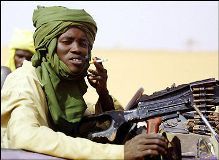Darfur rebel group says it would favor UN sanctions against Sudan
By ELLEN KNICKMEYER, Associated Press Writer
NDJAMENA, Chad, Sep 23, 2004 (AP) — One of western Sudan’s main rebel movements spoke in favor Thursday of U.N. sanctions against Sudan, saying that only such pressure would get the government to stop the killing in Darfur.
 Two political leaders of the Sudan Liberation Army spoke to The Associated Press in the capital of Chad, the western neighbor of Sudan, days after the U.N. Security Council resolved to consider oil sanctions on Sudan over the government’s alleged backing for ethnic cleansing in Darfur.
Two political leaders of the Sudan Liberation Army spoke to The Associated Press in the capital of Chad, the western neighbor of Sudan, days after the U.N. Security Council resolved to consider oil sanctions on Sudan over the government’s alleged backing for ethnic cleansing in Darfur.
“Sanctions will help pressure this government, will help this government come to its senses,” said Sharif Harir, who was chief negotiator for the Sudan Liberation Army at the failed peace talks in Nigeria.
“The government is using this oil revenue to buy weapons, guns, (Russian) Antonovs (planes) to kill our people. So I have to support (the sanctions),” said Adam Shogar, another of the rebel group’s leaders.
In an 11-0 vote on Saturday with four abstentions — China, Russia, Pakistan and Algeria — the Security Council said it would meet again to consider sanctions against Sudan’s petroleum sector, or other measures, if Sudan did not act quickly to stop the violence in Darfur and bring the perpetrators to justice.
The resolution also authorized U.N. Secretary-General Kofi Annan to appoint a commission to investigate reports of human rights violations in Darfur and determine “whether or not acts of genocide have occurred,” as the United States and others have charged.
Western Sudan’s bloodletting began when the Sudan Liberation Army and a second rebel group, the Justice and Equity Movement, began attacks on government targets in February 2003, accusing the central government of neglect and discrimination. Both groups hail from Darfur’s people of African origin.
The government and its allied Arab militia, the Janjaweed, are accused of retaliating by waging a campaign against Darfur’s non-Arab people, driving an estimated 1.4 million Sudanese Africans from their homes. U.N. officials believe that more than 50,000 people have died in the conflict.
Critics of sanctions as a diplomatic weapon say they create hardship for a country’s people while doing little to force change.
Harir said that in Sudan, only the ruling elite controls oil and the oil wealth, and only they would be suffer from U.N. sanctions.
As for sanctions hurting the people, “One-point-four million people are without homes. What more hardship is there than that?” Harir asked rhetorically.
The peace talks at which Harir represented his group broke down last week with the two sides agreeing to no more than to meet again at an unspecified date.
Harir said he was confident that the U.N. investigation would find that genocide has been committed in Darfur.
“There aren’t any Arabs in those refugee camps,” he said of the displaced people in Darfur and across the border in neighboring Chad.
The other rebel group, the Justice and Equity Movement, has not commented publicly on the threat of sanctions. Its leaders could not be reached for comment Thursday.
